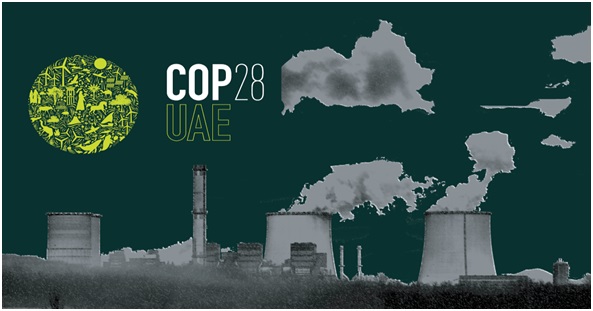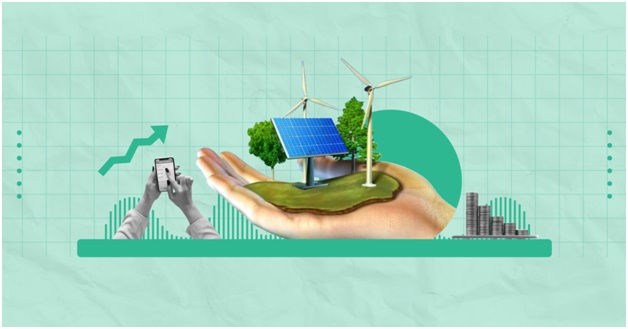Oil Producers Water Down Provision on Fossil Fuel Phase-out (Indian Express)

- 12 Dec 2023
Why is it in the News?
After four days of deadlock, a new draft agreement text emerged at the COP28 climate meeting that severely watered down earlier provisions on fossil fuel elimination but singled out coal for a rapid phase-down, which could be problematic for India.
Context:
- The 28th Conference of the Parties (COP 28) to the United Nations Framework Convention on Climate Change is underway in the United Arab Emirates from November 30 to December 12, 2023.
- During the climate meeting on December 10, negotiators took an initial step toward enhancing action on adapting to climate change.
- A draft text outlining potential "global goals" on adaptation was introduced for the first time, serving as a starting point for further negotiations.
- Negotiators are actively discussing various topics, including the contentious issue of fossil fuel phase-out, in informal sessions to find common ground.
- The draft document is titled 'Global Goal on Adaptation' (GGA) and aims to establish a shared global objective for adaptation, similar to the global goal of limiting temperature rise below the 1.5 degrees Celsius threshold for mitigation.
- This initiative addresses a longstanding demand from developing countries, emphasizing the need for increased focus and resource mobilisation for adaptation efforts.
- Notably, the draft removes the term 'phasing out' of fossil fuels but includes stronger language against coal, urging a "rapid phase-down of unabated coal," a point that may face objections from major consumers like India, Indonesia, and China, all developing countries heavily reliant on coal power.
Responses to the Draft Text 'Global Goal on Adaptation':
- The European Union (EU) and certain small island states promptly dismissed the draft agreement text.
- The EU climate commissioner criticized the overall insufficiency of the text, deeming it inadequate in addressing the climate change challenge.
- Primary dissatisfaction arose from the weakening of a provision related to the use of fossil fuels.
- The draft initially urged countries to "reduce both consumption and production of fossil fuels, in a just, orderly, and equitable manner."
- Notably, fossil fuels, responsible for nearly 80 percent of greenhouse gas emissions, have never been explicitly mentioned in prior COP decisions.
- While previous decisions emphasized the need to cut emissions, they avoided specifying actions for emission reduction.
- COP28 marked the first formal discussion of a fossil fuel phase-out but attempts to incorporate a robust provision faced resistance from oil-producing nations like Saudi Arabia and Russia.
- India, while not offering an immediate reaction to the draft agreement, has consistently asserted that singling out coal for accelerated reduction is discriminatory.
India's Ambitious Initiative to Expand Renewable Energy Capacity (Indian Express)

- 11 Dec 2023
Why is it in the News?
The Ministry of New and Renewable Energy (MNRE) has proposed an exemption for green hydrogen developers from adhering to its list of authorised manufacturers to enable them to import solar PV modules and wind turbine models from China.
What Does The Ministry of New and Renewable Energy (MNRE) Propose?
- The Ministry of New and Renewable Energy (MNRE) is exploring the option of granting an exemption to green hydrogen developers from its list of authorized manufacturers.
- This proposed exemption would enable these developers to import solar PV modules and wind turbine models from China, aiming to enhance the competitiveness of green hydrogen exports.
- It's noteworthy that Chinese manufacturers are presently absent from MNRE's Approved List of Models and Manufacturers (ALMM) and Revised List of Models and Manufacturers (RLLM).
The MNRE’s Proposal Background:
- After the 2020 Galwan Valley skirmishes, the Indian government issued directives to restrict the involvement of Chinese vendors in public procurement.
- Recently, the Indian procurement portal GeM announced the removal of hundreds of Chinese vendors over the past three years.
- At a time when energy companies are intensifying efforts to mass-produce green hydrogen, essential for which are renewable energy equipment and electrolysers, the government has sidelined Chinese manufacturers.
- This aligns with the MNRE's policy to enhance domestic manufacturing of renewable energy equipment.
- While central PSUs may face restrictions on importing electrolysis machinery from China, others continue to do so.
- In FY23, India witnessed a 40% increase, in importing machines and apparatus for electroplating, electrolysis, and electrophoresis, worth $45.61 million, compared to the preceding fiscal year.
What is the Significance of the MNRE’s Proposal?
- ??The proposal to import solar PV modules from China carries significance in bolstering the supply chain and enhancing the global competitiveness of Indian green hydrogen exports.
- Central PSUs such as Indian Oil Corporation Ltd and NTPC Ltd, both actively involved in green hydrogen projects, would benefit by sourcing equipment from Chinese manufacturers.
- This move is poised to strengthen India's position in the global green hydrogen market, aligning with the objectives outlined in the National Green Hydrogen Mission and facilitating the achievement of set targets.
